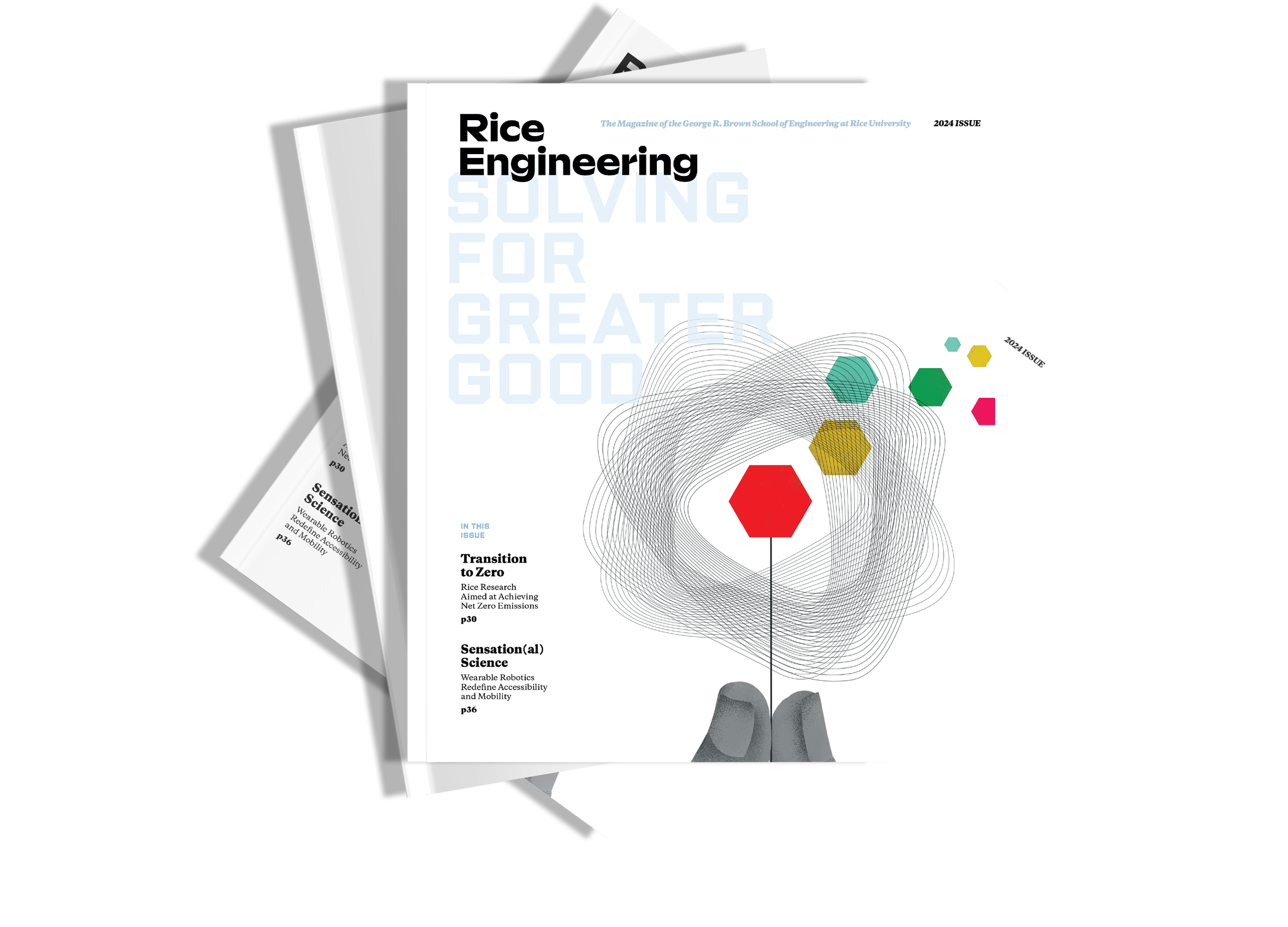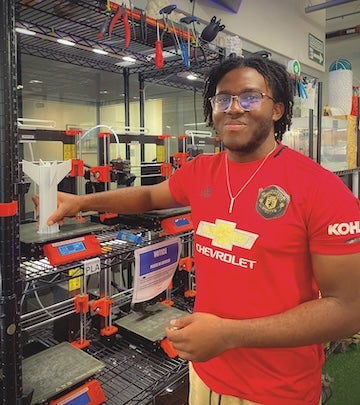
The spring 2024 issue of Rice Engineering Magazine is here!
At Rice Engineering, we are driven by a passion for innovation and a commitment to responsible engineering practices. It’s with great excitement that we unveil the new design of Rice Engineering magazine, which underscores our dedication to excellence in research, education, and service. The 2023-24 issue is full of news about how Rice Engineering is solving for greater good.
SEE through Their Eyes
![Favour Williams]() Favor Williams
Favor Williams
Navigating one’s learning journey in an internship can be daunting. Faced with real world problems, juggling deadlines, and new company cultures, any first-time intern could feel uncertain of how to put their best foot forward. However, given the right support network and difficult yet rewarding challenges, interns can be pushed to succeed beyond their expectations. This was my experience during my transformative internship at California Resources Corporation (CRC) thanks to the efforts of the Rice Engineering Alumni Summer Engineering Experience (SEE).
In summer 2023, I interned with CRC’s Carbon Teravault team, whose mission is to sequester carbon dioxide (CO2) in depleted oil and gas reservoirs for immediate decarbonization and long-term carbon neutrality. My role as a carbon capture and sequestration (CCS) well engineer was to assess the mechanical integrity of wells earmarked for CCS projects, provide recommendations for reutilizing existing wells, and mitigate project risk.
My role required a deep understanding of underground reservoirs, the nature of CO2, and the resilience of oil and gas infrastructure, particularly in the context of mechanical well integrity. In the intricacies of my projects at CCS, the knowledge I gained at Rice was immediately put to use.
The transition from academic theory to practical application was seamless due to SEE’s guidance and the confidence it instilled in me. My foundation in mathematics and thermodynamics helped me navigate complex data analysis. I learned to interpret data from electromagnetic induction tools used in cased hole logging suites and wireline operations. This was key in identifying internal and external well casing defects. I provided engineering recommendations based on this extensive analysis, considering project economics and risk. Going beyond the initial project requirements, I automated the well data analysis which improved data accuracy, reduced analysis time for project wells, mitigated project risk, and introduced cost savings of up to $8,000 per well.
Reflecting on my CRC journey, I’m grateful for my CRC team and Rice Engineering Alumni’s Summer Engineering Experience. It exemplifies the power of bridging academic knowledge with real-world experience, an essential for engineering excellence. The SEE program is not merely a stepping stone. It is truly a light that guides students on their professional development path.
Favour Williams is a junior majoring in mechanical engineering.
![Noemi Moreno]() Noemi Moreno
Noemi Moreno
As an Engineering student entering a prestigious university, navigating the internship application process felt overwhelming. I lacked direction on where to apply, how to present myself, and what to anticipate from such an internship experience.
Seeking guidance, I turned to the Rice Engineering Alumni Summer Engineering Experience program. I was particularly drawn to Key Capture Energy, a company contributing to renewable energy — a field I’m passionate about. Landing an internship there after my sophomore year was an invaluable opportunity to explore one of the many paths an electrical engineering degree could offer.
Under the guidance of my supervisor, Alicia Boyd, a project manager, I learned firsthand the significance of not just technical expertise but also effective communication and coordination across diverse teams. This experience prompted me to reflect on my future career aspirations.
The REA didn’t just facilitate my first internship; it provided crucial mentorship and support. From Jim Pyke’s explanations of engineering concepts to insightful advice from interviewers and ongoing encouragement from my REA mentor, Gabriella Buba, the program introduced me to a network genuinely invested in my success.
This initial internship led to a return offer the following summer and gave me the confidence to apply for an internship in Argentina. Transitioning from computer-based work for a medium-sized company to a more hands-on role for a large organization was a shift, but my prior experience pushed me to engage more actively, ask questions, and connect with my colleagues.
Overall, the REA SEE program profoundly shaped my career perspective, prepared me for future opportunities, and clarified my professional aspirations as I approach graduation in spring 2024.
Noemi Moreno, pictured second from left, is a senior studying electrical engineering.

Syzygy Plasmonics: Developing a Decarbonized Future
Syzygy Plasmonics is a deep-decarbonization company. It builds reactors that use light instead of combustion to electrify chemical manufacturing and power a cleaner, safer world. Utilizing photocatalysts developed in the Nanophotonics Lab at Rice University and advanced engineering, Syzygy is commercializing a universal photocatalytic reactor platform. When powered with renewable electricity, this tunable technology is designed to reduce cost and emissions from various chemical reactions. Starting with solutions designed to consume greenhouse gases and produce low- and zero-emissions hydrogen, the company’s mission is to create a world where chemicals, fuels, and fertilizer are low cost, carbon neutral, and accessible to everyone.
Co-founder and Chief Technology Officer Suman Khatiwada earned his Ph.D. in materials science and nanoengineering from Rice, and Rice professors Naomi Halas and Peter Nordlander continue to support Syzygy as co-founders and technical advisors. The company has a strong connection to the university with multiple alumni on staff serving in research and development, corporate development, and engineering roles. Syzygy has hosted multiple interns from Rice and is a strong supporter of the Rice Engineering Alumni Summer Engineering Experience internship program.
In the summer of 2023, the company engaged engineering majors Jason Lee and Jonathan (JJ) Jang as interns. “We were fortunate to have Jason and Jonathan intern with Syzygy over the summer,” said Principal Software Architect Shiv Kandevalu. “They were instrumental in developing a data pipeline and operations dashboard that we use to monitor key performance indicators during hydrogen production. The work they did here is helping us test and operate the world’s first all-electric, light-powered chemical reactor.”
As ongoing operation and testing of its Rigel™ photoreactors progress, Syzygy sets its sights on the next significant milestone — the installation of its first commercial-scale reactor at a customer site in 2024 — with expectations to sign contracts to deliver one ton/day of hydrogen starting in 2025. Long-term plans include moving to mega-scale projects in the late 2020s. Syzygy is a great example of how research and discoveries made at Rice can advance into commercial applications that have the potential to make meaningful global impacts as well as support the development of the next generation of engineers.
![Caleb McKinney]() Uber-cool: From Small Town to Big Tech
Uber-cool: From Small Town to Big Tech
Caleb McKinney, a class of 2025 computer science major and a participant in the Rice Emerging Scholars Program (RESP), recently completed a summer internship with Uber as part of the UberSTAR program in New York City. This paid student internship initiative aims to foster equal opportunity, inclusion, and accessibility in the tech industry, with a focus on encouraging applications from women and individuals from underrepresented backgrounds who have completed their first or second year of college.
Caleb’s journey began in a small town in Alabama, where he was part of a graduating high school class of approximately 50 students. His passion for programming began at a young age, particularly in creating games. But pursuing this passion proved challenging as Weaver High School did not offer Advanced Placement courses in computer science or any other subject. Caleb’s strong interest in computer programming led him to be primarily self-taught.
While Weaver High School had a tradition of most graduates choosing to attend state schools for further education, Caleb’s analytical approach to considering school quality, financial aid, and other associated benefits, led him to Rice.
The Rice Engineering Alumni (REA) Board works extensively with RESP as part of the REA’s Summer Engineering Experience. As part of this initiative, Caleb had the opportunity to learn about networking and career development. The REA partnered with the Center for Career Development (CCD) to discuss job search strategies, which Caleb found invaluable. Caleb observed that “having an actionable framework for networking made it much easier to do as opposed to vague advice like ‘you should network.’”
Caleb’s journey to securing an internship at Uber was a testament to his persistence and proactive approach to applications, especially as an underclassman. A crucial aspect that facilitated Caleb’s journey to Uber was the support he received from an REA board member and former Uber employee, John Mulgrew, Rice ’89. The SEE program pairs students with mentors to provide advice and support throughout summer internships. John not only mentored Caleb but also wrote a strong recommendation letter to bolster Caleb’s application to Uber.
During his internship at Uber, Caleb’s confidence soared as he actively contributed to regular code releases. “For me, there was such a difference in my confidence before and after the internship. I was actually working with a team of high-level engineers, and my work made a significant contribution to that team,” he said.
Caleb’s experience is instructive to all underclass students seeking internships. First, have the determination to pursue opportunities, even those beyond the usual job platforms. Second, students who show their passions in interviews leave a lasting impression.
The REA is always looking for more mentors for students to help them acclimate to the professional working environment as well as internship opportunities for deserving students. John Mulgrew observed that “helping Rice students figure out the beginning of their engineering career is an incredibly rewarding experience. I highly encourage our alums to get involved. Your time and experience can have a huge impact.”

 Favor Williams
Favor Williams Noemi Moreno
Noemi Moreno Uber-cool: From Small Town to Big Tech
Uber-cool: From Small Town to Big Tech